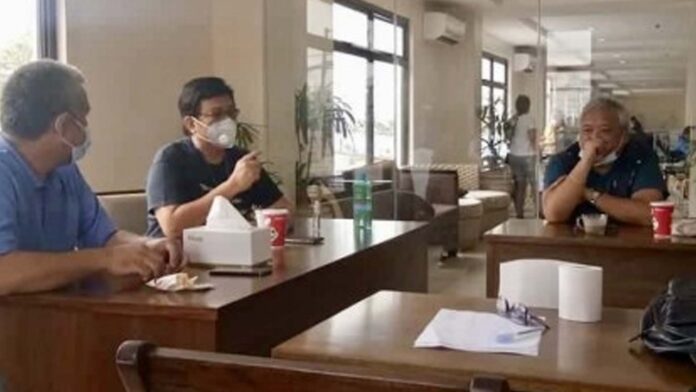Mayor Edgardo Labella has announced that strategic testing for coronavirus disease 2019 (Covid-19) in 12 barangays here in order to come up with a scientific basis in declaring general community quarantine (GCQ) has been moved to May 6.
During an emergency meeting with Cebu City Health Department (CCHD) officials and Department of Health-Central Visayas (DOH-7) director Jaime Bernadas on Sunday, Labella underscored the need to postpone the rapid testing “to address issues and concerns of (the) barangays and (its) residents.”
The strategic testing was supposed to start Monday (May 4) in barangays Inayawan, Basak-Pardo, Cogon, Mambaling, Sawang Calero, Suba, Bulacao, Basak-San Nicolas, Duljo, Punta Princesa, Kinasang-an and Tisa.
Labella, Bernadas, Mandaue City Mayor Jonas Cortes, Lapu-Lapu City Mayor Junard Chan and Office of the Presidential Assistant for the Visayas (OPAV) Secretary Michael Lloyd Dino announced the mass testing during the launching of Project Balik Buhay program.
The program initiated by Dino and Bernadas in partnership with the cities of Mandaue, Cebu and Lapu-Lapu, is conceptualized in order to come up with an evidenced-based justification in transitioning from the enhanced community quarantine (ECQ) to GCQ.
According to the plan, around 47,000 individuals from the three cities will undergo rapid antibody tests in a 10-day specimen collection. Positive results will be subjected to confirmatory polymerase chain reaction (PCR) tests.
Meanwhile, medical experts have recommended the rapid antibody-based diagnostic test for the massive testing, Labella said.
Medical experts described the PCR as the “gold standard” in coronavirus disease 2019 (Covid-19) diagnostics; while rapid antibody-based diagnostic test (RDT) aims to test for the antibodies to establish a person’s exposure to infected individuals, or is currently fighting for infection in acute phase.
Dr. Mary Jean Loreche, chief pathologist of DOH-Central Visayas, said that while reverse transcription (RT) PCR tests the presence or absence of the SARS-CoV 2, both tests are not foolproof.
“In our fight against Covid-19, testing is an essential tool. PCR, being the gold standard will test the presence or absence of the virus, aiming to know if a person is infected. The rapid antibody test, on the other hand, as the name implies, aims to test for the antibodies, whose aim is to establish that a person has been exposed to an infected individual or is presently with the infection, without knowing it. This is especially true for those who don’t manifest any symptoms at all,” Loreche was quoted in a statement from the OPAV.
Dr. Juanito Zuasola, epidemiologist at the Regional Epidemiology and Surveillance Unit (RESU)-Central Visayas, said “the usefulness and significance of RDT is when the test results are placed in the proper perspective.”
The antibodies either IgM (immunoglobulin M) or IgG (immunoglobulin G), whichever is present, can help group the patients or persons into those that will require PCR or not.
“The test results from both tools can now help further in addressing which group/class of persons will be placed in the isolation/quarantine facilities,” Zuasola said.
Dr. Gerardo Aquino Jr., chief of the Vicente Sotto Memorial Medical Center (VSMMC), cited the capabilities of local testing sites if a massive RT PCR testing will be done.
He assured the public that the VSMMC sub-national laboratory is working to keep up with the rising number of samples, keeping in mind the prioritization criteria set by the DOH policy, including those who are admitted at hospitals, and “is supportive of a strategic mechanism in mapping Covid-19 transmission in our local community so that testing resources are efficiently used.”
The city government and the Cristina Lee Dino Foundation, through OPAV, donated RT-PCR machines, automated extraction machines, test kits, swab kits and other supplies to DOH-7 and VSMMC in order to augment the testing capacity in the facility.
Bernadas said with this RDT mass testing, decision makers can decide to downgrade the community quarantine status.
“These test results can now be used to help in mapping population and areas in the locality that can serve to guide the decision makers into checking the effectiveness, or in setting up control measures and even modifying these measures in pursuing decisions for community quarantine,” Bernadas pointed out. (PNA)


